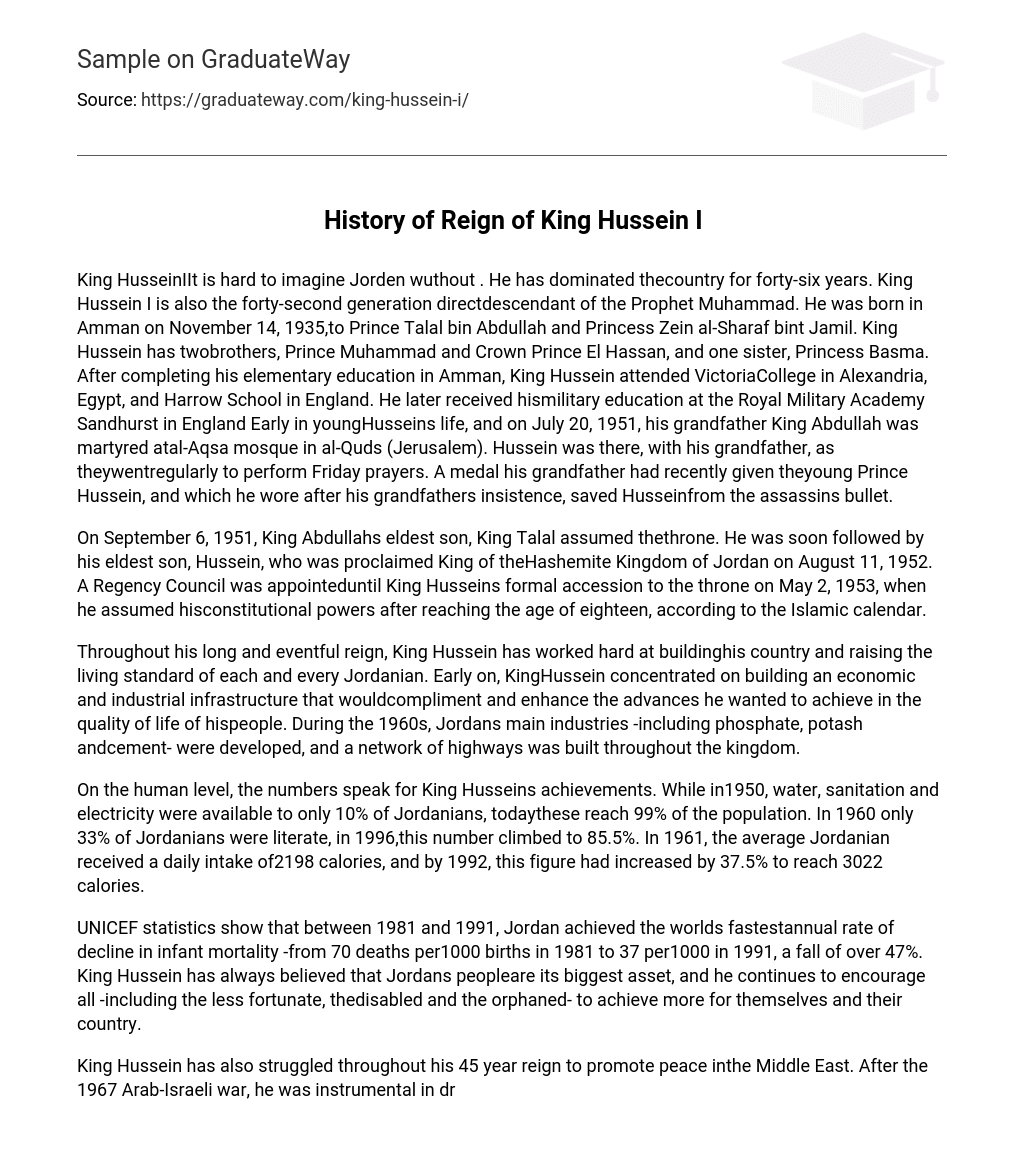King HusseinIIt is hard to imagine Jorden wuthout . He has dominated thecountry for forty-six years. King Hussein I is also the forty-second generation directdescendant of the Prophet Muhammad. He was born in Amman on November 14, 1935,to Prince Talal bin Abdullah and Princess Zein al-Sharaf bint Jamil. King Hussein has twobrothers, Prince Muhammad and Crown Prince El Hassan, and one sister, Princess Basma. After completing his elementary education in Amman, King Hussein attended VictoriaCollege in Alexandria, Egypt, and Harrow School in England. He later received hismilitary education at the Royal Military Academy Sandhurst in England Early in youngHusseins life, and on July 20, 1951, his grandfather King Abdullah was martyred atal-Aqsa mosque in al-Quds (Jerusalem). Hussein was there, with his grandfather, as theywentregularly to perform Friday prayers. A medal his grandfather had recently given theyoung Prince Hussein, and which he wore after his grandfathers insistence, saved Husseinfrom the assassins bullet.
On September 6, 1951, King Abdullahs eldest son, King Talal assumed thethrone. He was soon followed by his eldest son, Hussein, who was proclaimed King of theHashemite Kingdom of Jordan on August 11, 1952. A Regency Council was appointeduntil King Husseins formal accession to the throne on May 2, 1953, when he assumed hisconstitutional powers after reaching the age of eighteen, according to the Islamic calendar.
Throughout his long and eventful reign, King Hussein has worked hard at buildinghis country and raising the living standard of each and every Jordanian. Early on, KingHussein concentrated on building an economic and industrial infrastructure that wouldcompliment and enhance the advances he wanted to achieve in the quality of life of hispeople. During the 1960s, Jordans main industries -including phosphate, potash andcement- were developed, and a network of highways was built throughout the kingdom.
On the human level, the numbers speak for King Husseins achievements. While in1950, water, sanitation and electricity were available to only 10% of Jordanians, todaythese reach 99% of the population. In 1960 only 33% of Jordanians were literate, in 1996,this number climbed to 85.5%. In 1961, the average Jordanian received a daily intake of2198 calories, and by 1992, this figure had increased by 37.5% to reach 3022 calories.
UNICEF statistics show that between 1981 and 1991, Jordan achieved the worlds fastestannual rate of decline in infant mortality -from 70 deaths per1000 births in 1981 to 37 per1000 in 1991, a fall of over 47%. King Hussein has always believed that Jordans peopleare its biggest asset, and he continues to encourage all -including the less fortunate, thedisabled and the orphaned- to achieve more for themselves and their country.
King Hussein has also struggled throughout his 45 year reign to promote peace inthe Middle East. After the 1967 Arab-Israeli war, he was instrumental in drafting UNSCResolution 242 which calls on Israel to withdraw from all the Arab lands it occupied in the1967 war in exchange for peace. This resolution has served as the benchmark for allsubsequent peace negotiations. In 1991, King Hussein played a pivotal role in conveningthe Madrid Peace Conference, and providing an “umbrella” for Palestinians to negotiatetheir future as part of a joint Jordanian-Palestinian delegation. The 1994 Peace Treatybetween Jordan and Israel is a major step toward achieving a just, comprehensive andlasting peace in the Middle East.
While working towards Arab-Israeli peace, King Hussein has also worked toresolve disputes between Arab states. During the 1990-91 Gulf Crisis, he exertedvigorous efforts to peacefully effect an Iraqi withdrawal and restore the sovereignty ofKuwait.
King Hussein has persevered in his pursuit of genuine Arab reconciliation,wherever a conflict may arise between neighbors or within a country, such as his recentmediation in the Yemeni civil war.Furthermore, and in almost every speech or forum,King Hussein calls for international humanitarian aid to relieve the people and children ofIraq from their daily suffering.
King Husseins commitment to democracy, civil liberties and human rights hashelped pave the way in making Jordan a model state for the region. The kingdom isinternationally recognized as having the most exemplary human rights record in the MiddleEast, while recent reforms have allowed Jordan to resume its irreversible drive todemocratization. In 1990 King Hussein appointed a royal commission representing theentire spectrum of Jordanian political thought to draft a national charter. Today theNational Charter, along with the Jordanian Constitution, serves as a guideline fordemocratic institutionalization and political pluralism in the country. In 1989. 1993 an1997, Jordan held parliamentary elections which were accredited internationally as amongthe freest and fairest ever held in the Middle East.
King Hussein married Queen Noor on June 15, 1978. They have four children:Hamzah, Hashem, Iman and Raiyah. His Majesty also has eight children -Alia, Abdullah,Faisal, Zein, Aisha, Haya, Ali and Abeer- from three previous marriages. To his delight,King Hussein is the proud grandfather to a growing number of grandchildren.
HRH Prince Muhammad, the Personal Representative of His Majesty, has twosons: Talal and Ghazi. HRH Crown Prince El Hassan has four children: Rahma, Sumayya,Badiya, Rashid and three grandchildren. HRH Princess Basma has four children: Farah,Ghazi, Saad, and Zein.
King Hussein is an accomplished aviator, motorcyclist and race-car driver. He alsoenjoys water sports, skiing, tennis, ham radio, and surfing the Internet. King Hussein readsextensively on political affairs, history, international law, military science and aviation. Inaddition to being an avid reader, the King has also been the subject of numerous books.
He himself has written three books: Uneasy Lies the Head (1962), about his childhood andearly years as king, My War With Israel (1969), and Mon Mtier de Roi.





